八年级上册英语第二单元课件
合集下载
人教版八年级英语上册第二单元课件
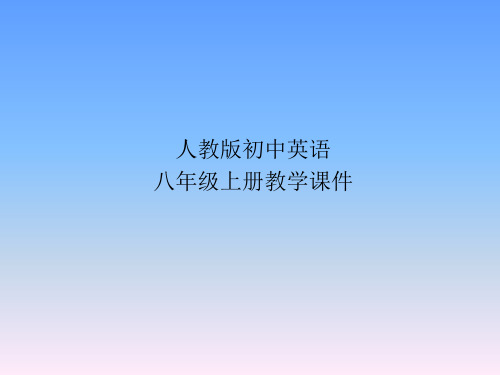
4. 每周五次 __fi_v_e__ti_m__e_s_a__w__e_e_k___ 5. 每月两次 _t_w__ic_e__a_m__o_n__t_h_ 6. 大多数人 _m__o_s_t_p_e_o_p__le_ 7. 活动调查 _a_c_t_iv_i_t_y_s_u__r_v_e_y 8. 至于; 关于 ___a_s__f_o_r__ 9. 去购物 _g_o__s_h_o_p_p__in__g_ 10. 看电视 __w_a_t_c_h__T__V___
The results for “watch TV” are interesting.
_S_o_m__e students watch TV once or twice a week,
s_tio_m_me_es_
students watch TV __t_h_r_e_e__ _o_r_ _f_o_u_r__ a week, but most students watch _e_v_e_ry_
Do you know?
• sometime 某个时间 • some time 一段时间 • sometimes 有时 • some times 几次
I sometimes go to school by bus. I will go to America sometime this year.
人教版初中英语 八年级上册教学课件
Unit 2 How often do you exercise?
Section A Period 1
Are you healthy?
Do you often drink milk? Do you eat fruit and vegetables everyday? Do you often do your exercise?
The results for “watch TV” are interesting.
_S_o_m__e students watch TV once or twice a week,
s_tio_m_me_es_
students watch TV __t_h_r_e_e__ _o_r_ _f_o_u_r__ a week, but most students watch _e_v_e_ry_
Do you know?
• sometime 某个时间 • some time 一段时间 • sometimes 有时 • some times 几次
I sometimes go to school by bus. I will go to America sometime this year.
人教版初中英语 八年级上册教学课件
Unit 2 How often do you exercise?
Section A Period 1
Are you healthy?
Do you often drink milk? Do you eat fruit and vegetables everyday? Do you often do your exercise?
八年级上册英语第二单元ppt课件

Key presence analysis
Identify the key presence of each paragraph
The key presence expresses the paragraph's main idea and commonly appears at the beginning or end of the paragraph
Derivatives
Key vocabulary often has derivative words that can help in understanding the meaning and usage of the root words
Example of vocal application
Domain specific vocabulary
Vocabulary related to a specific subject or domain, such as science, technology, literature, etc
03
General/basic vocabulary
Common words that are widely used in daily life and have a
Read through the exercise carefully, paying attention to details and making notes as necessary
05
Writing training
Writing Skills Tips
Use appropriate language
Example sentences
I watch TV every day He watches football games They watch movies on weekends
八年级上英语M2u2课件

Compare : Cambridge VS London
A small city 120,000 people
The capital of UK Seven and a half million people London is bigger and busier than Cambridge。
Hong Kong about 150 years old
old Shanghai 700 years old Shanghai is older than Hong Kong.
Guess: What do the letters stand for?
N north west W E east
S south
The capital , 7 and a half million people, bigger and an old city—about 2000 years old
The River Thames 336KMs Long
Tower Bridge
London Big Ben
Buckingham Palace
You are always near the sea. The small villages and beaches on the
An island
It’s never very hot in the summer, or very cold in the winter.
Cambridge VS London:
The UK (The Great Britain)
a region of Britain
England
in the 1. Cambridge is _____ east ______of England. in the ______ south 2. London is ____ of England. in the _______ west 3. Bristol is ____ of England.
八年级(上册)英语第二单元课件.ppt
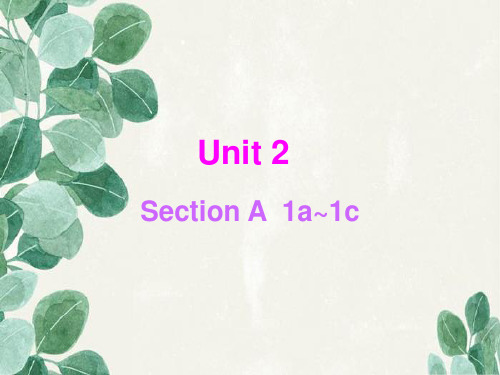
4. What does your mother do on Sunday? She usually _g_o_e_s__ s_h_o_p_p_in_g_ (去购物).
1b
exercise do some reading
go shopping
watch TV
e
help with housework
4. have …lesson 上….课 eg: 上英语课 have English lesson 上钢琴课 have piano lesson lesson 为可数名词
5. 他经常去踢足球在星期天。 He often _p_la_y_s_ football on S__u_n_d_a_y.
6. Tom 从来不帮忙做家务。 Tom _n_e_v_e_r _h_e_l_p_s_ with housework.
7.我的奶奶很少外出。 My grandma _h_a_r_d_ly__ __e_v_e_r__ goes out.
1. help sb with sth
帮助某人
help sb (to) do sth 做某事
help with sth 帮助做某事 2. housework 不可数名词
What do you do on weekends?
I hsuaoonsrlfmwudteeavlenyleytlirysemvers play football on weekends.
2. Ask and answer, complete the chart.(P16 ,Part 1)
3. To read and remember the new words.
Unit 2
Section A 2d~3c
1b
exercise do some reading
go shopping
watch TV
e
help with housework
4. have …lesson 上….课 eg: 上英语课 have English lesson 上钢琴课 have piano lesson lesson 为可数名词
5. 他经常去踢足球在星期天。 He often _p_la_y_s_ football on S__u_n_d_a_y.
6. Tom 从来不帮忙做家务。 Tom _n_e_v_e_r _h_e_l_p_s_ with housework.
7.我的奶奶很少外出。 My grandma _h_a_r_d_ly__ __e_v_e_r__ goes out.
1. help sb with sth
帮助某人
help sb (to) do sth 做某事
help with sth 帮助做某事 2. housework 不可数名词
What do you do on weekends?
I hsuaoonsrlfmwudteeavlenyleytlirysemvers play football on weekends.
2. Ask and answer, complete the chart.(P16 ,Part 1)
3. To read and remember the new words.
Unit 2
Section A 2d~3c
人教PEP八年级英语上册第二单元Section A (1a-2d)教学PPT课件

4. How often & How many times e.g. 你多久上一次钢琴课? 你一周上几次钢琴课? How often do you have piano lesson? How many times do you have piano lessons?
How often + 助动词 do (does 或 did) + 主语 + do sth. ? 是对 频率(多久一次)进行提问。疑问词 how often (在这里助动 词 do, does, 或 did 是起疑问的作用) 与一般现在时或一般过 去时连用,回答一般用表频率的副词 always, usually, often, sometimes, never 等或者是“数次 + 一段时间”,如 once/twice a month, three times a month, every year, every week 等。
What does Alice do on weekends?
She often helps with housework.
1b
Listen and write the activities next to the correct frequency words.
1. always (100%) ___e_x_e_r_ci_s_e_, _re_a_d 2. usually __w__a_tc_h__T_V____ 3. often _h_e_lp__w_i_t_h_h_o_u__se_w__o_r_k_ 4. sometimes __g_o_s_h_o_p_p_i_n_g__
hard也用副词,“努力地、刻苦地”,“猛烈地” 。 e.g. 他只在考试前努力学习。 (翻译)
人教版八年级英语上册Unit2全单元课件

conversations about what you do on
weekends. What do you do on weekends?
I usually watch TV.
Do you go shopping?
No, I never go shopping.
What does she do on weekends?
1. To learn to talk about how often you do things with some adverbs of frequency: always/ usually/ often/ sometimes/ hardly ever /never/ twice…
2. To listen for some specific information in conversations
adv. 几乎不 adv. 在任何时候;从来;曾经
5. hardly ever _w_a_t_c_h__T_V____ hardly ever 6. never (0%) _g_o_s_h_o_p_p__in_g__ 几乎从不
听力原文
Reporter: What do you do on weekends? Girl 1: I sometimes go shopping. Boy 1: I never go shopping.I usually watch TV. Boy 2: I always exercise. Girl 2: I often help with housework. Reporter: How about you? Girl 3: I hardly ever watch TV.I always read. Reporter: Oh,why is that? Girl 3: Oh,I don’t know.I guess I just like
人教英语八年级上册 Unit2 Section B 2a-2e (共20张PPT)
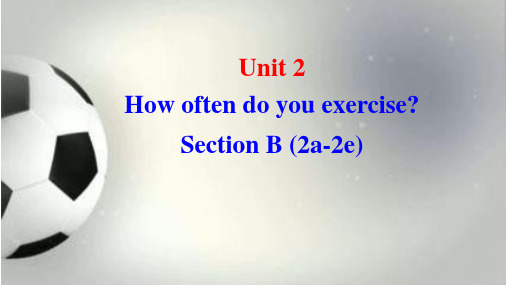
The answers to our questions about watching television were also interesting. Only 2% of the students watch TV one to three times a week.13% watch TV four to six times. And 85% watch TV every day ! Although many students like to watch sports, games shows are the most popular.
Let’s do a survey.
What do you do in your free time? Do exercise, use the Internet or watch TV? What activity do you think is good for your health and mind?
It is good to relax by using the Internet or watching game shows, but we think the best way to relax is through exercise. It is healthy for the mind and the body. Exercise such as playing sports is fun, and you can spend time with your friends and family as you play together. And remember , “old habits die hard” . So start exercising before it's late!
初二英语外研版八年级上册 Module 2 Unit 2 课件(共59张PPT)
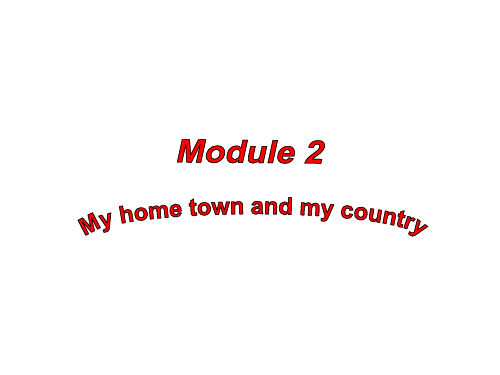
countryside are honest. 这些农村来的年轻人都很老实。 area n. 地区;区域 e.g. There are many gardens in this area. 这一地区有很多公园。
mountain n. 山;山丘 e.g. The mountain is 3500 meters high.
London In the south of England
Population
120,000
About 7.5 million
Famous places River
University, old buildings and churches
River Cam
Big Ben, Buckingham Palace, Tower Bridge
2. Tourists like the areas of low mountains and beautiful lakes in the snoourtthh. .
3. You should bring an umbrella with you when you are in England.
Read Para. 3-4 and answer:
Tell where the four cities are.
Beijing Guangzhou Chengdu Shanghai
Look at the pictures and listen.
a
Read the passage and choose a title for each picture below. 1. Tower Bridge and the River Thames 2. Cambridge University and the River Cam
mountain n. 山;山丘 e.g. The mountain is 3500 meters high.
London In the south of England
Population
120,000
About 7.5 million
Famous places River
University, old buildings and churches
River Cam
Big Ben, Buckingham Palace, Tower Bridge
2. Tourists like the areas of low mountains and beautiful lakes in the snoourtthh. .
3. You should bring an umbrella with you when you are in England.
Read Para. 3-4 and answer:
Tell where the four cities are.
Beijing Guangzhou Chengdu Shanghai
Look at the pictures and listen.
a
Read the passage and choose a title for each picture below. 1. Tower Bridge and the River Thames 2. Cambridge University and the River Cam
外研版八年级英语上册Module2 Unit2课件ppt

ቤተ መጻሕፍቲ ባይዱ
对形容词进行感叹用how
在句子中起宾语作用的从句叫做宾 语从句。
课堂练习:
Ⅰ.用所给的词的适当形式填空: comes 1.That young man ______(come) form Cambridge.
buildings 2. There are lots of _______ (building) churches and_______(church) in Cambridge.
剑桥是英国剑桥郡首府,位于伦敦北。地 处平原,剑河从城市西门经市区流向东北, 注入乌斯河。从13世纪末创办剑桥大学的第 一所学院彼得学院起,剑桥作为一座大学城 存在至今。
剑桥大学 一所位于英国英格兰剑桥市的公立研究型大 学,始创于1209年,亦是英语世界里第二古老的 大学。剑桥大学在学术方面始终是世界领先的大 学之一,剑桥大学为书院联邦制大学,目前共有 31所住宿书院,而各个学术部门则被归入六个主 要的学术学院里。它也是众多学术联盟的成员之 一,为英国其中一所金三角名校。剑桥大学也是 诞生最多诺贝尔奖得主的高等学府共有89名诺贝 尔奖得主现在或曾经在剑桥大学学习或工作。
Words is part of learn English.
6.Everywhere in England you will notice how green the countryside is. 英国各地你都会注意到乡村真绿啊。
•in England:在英国,是介词短语做后置 定语,修饰Everywhere. 另外: 本句是含有宾语从句的复合句。主语为you will notice,从句为how green the countryside is,从句又是一个感叹句,
例如:YaoMing is famous as a basketball player. 姚明作为一名篮球运动员而著名。
对形容词进行感叹用how
在句子中起宾语作用的从句叫做宾 语从句。
课堂练习:
Ⅰ.用所给的词的适当形式填空: comes 1.That young man ______(come) form Cambridge.
buildings 2. There are lots of _______ (building) churches and_______(church) in Cambridge.
剑桥是英国剑桥郡首府,位于伦敦北。地 处平原,剑河从城市西门经市区流向东北, 注入乌斯河。从13世纪末创办剑桥大学的第 一所学院彼得学院起,剑桥作为一座大学城 存在至今。
剑桥大学 一所位于英国英格兰剑桥市的公立研究型大 学,始创于1209年,亦是英语世界里第二古老的 大学。剑桥大学在学术方面始终是世界领先的大 学之一,剑桥大学为书院联邦制大学,目前共有 31所住宿书院,而各个学术部门则被归入六个主 要的学术学院里。它也是众多学术联盟的成员之 一,为英国其中一所金三角名校。剑桥大学也是 诞生最多诺贝尔奖得主的高等学府共有89名诺贝 尔奖得主现在或曾经在剑桥大学学习或工作。
Words is part of learn English.
6.Everywhere in England you will notice how green the countryside is. 英国各地你都会注意到乡村真绿啊。
•in England:在英国,是介词短语做后置 定语,修饰Everywhere. 另外: 本句是含有宾语从句的复合句。主语为you will notice,从句为how green the countryside is,从句又是一个感叹句,
例如:YaoMing is famous as a basketball player. 姚明作为一名篮球运动员而著名。
译林版版八年级英语上册Unit2 Garmmar 课件 (共20张PPT)

Lead-in Presentation
Compare school lives
Practice
What about your school?
We have more ... than ... fewer ... than ... less ... than ... the most ... the fewest ... the least ...
their activity to the chairperson.
Name
Total number
Trees Carrying per hour water
Place
Tom
15
+ -er
+ -est
hard—harder —hardest
Long adverbs more +
Irregular adverbs
replace the word
most +
replace the word
carefully
—more carefully —most carefully
far
—farther/further —farthest/furthest
B Comparative and superlative adverbs
Presentation Practice Consolidation
Let’s play baseball!
John—2 hours Daniel—1.5 hours Nancy—1 hour
Nancy practises hard because she spends so long time practising. John practises harder than Nancy. John practises the hardest of all the three.
八年级英语上册 Unit2 What kind of music are they课件

Exercise
1.玲玲不喜欢流行音乐,是么? 是的,不喜欢。 like pop music, does Linglingdoesn’t ______ _______ _______ ________? _______, she______. she No doesn’t 2.你没听说过他,对么?不,我听说过。 You haven’t ______ heard ____ of him, _____ have ______? you Yes have ______, I _______. 3.他是德国人,是么?不,不是。 German _______ wasn’t he? ______, No he He was _______, _____. wasn’t 4.大明昨天没去学校,对么? 不,他去了。 school Damingdidn’t _______ goto ____ _________, ______ _____? ________, ____ did he Yes he _______. did
Pop music (流行音乐)
What kind of music is it ?
Jazz music (爵士乐)
How do you describe this type of music.
blues
classical jazz opera pop rock techno
beautiful dramatic fast fun lively modern sad serious slow traditional
Pair work
介绍自己喜欢的音乐并描述,运用反意疑问句。
A: What music do you like? B: I like pop music, it’s lively, isn’t it? A: Yes, it is. What about you? B: I like blues, it’s fast, isn’t it? A: No, it isn’t, it’s slow!
人教版英语八年级上册精-第二单元ppt课件
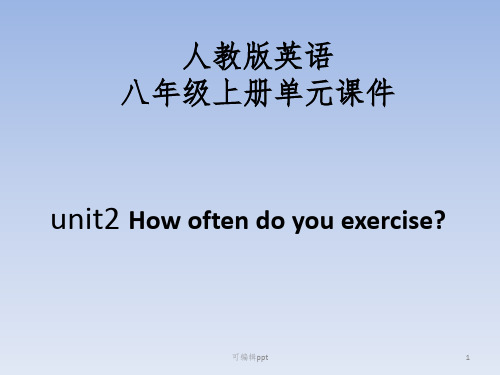
可编辑ppt
4
What do you do on weekends? I often/usually/...
often go shopping
hardly ever
help with housework
可编辑ppt
5
What do you do on weekends? I often/usually/...
hardlyever, never 与疑问词 how often 对应。表示的频率由 always 向 never 递减。
在句中位于实意动词之前,情态动词(can 等)、助动词(do 等)、连系动词(be 等)之后。但 sometimes 也可在句首。
Unit 2 How often do you exercise?
2d. Role-play the conversation.
可编辑ppt
18
1. Claire has piano lessons __t_w_i_c_e__ ( two ) a week.
2. He watches TV ___o_n_c_e__ (one) a week.
3. Katrina _e_x_e_r_c_is_e_s_ ( exercise ) every day.
( 你多久看一次电影?)
( 我大概一个月看一次电影。)
__H_o_w__o_f_te_n__d_o_e_s_h_e_w__a_tc_h__T_V_?____ ( 他多久看一次电视?)
_H_e__h_a_rd_l_y_e_v_e_r_w__a_tc_h_e_s_T_V__. ______ ( 他几乎不看电视。)
often Cheng Tao does them.
可编辑ppt
人教版八年级英语上册Unit2复习课件(共24张PPT)
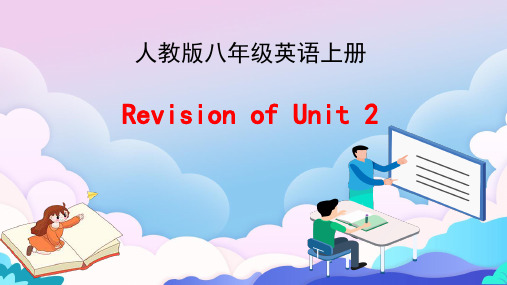
6.虽然许多学生喜欢看体育节目,但游戏类节目是最受欢迎的。
__A__lt_h_o_u_g__h_m__a_n__y_s_t_u_d_e__n_ts__l_ik_e__to__w__a_t_c_h_s__p_o_r_ts_,___g_ame shows are the most popular.
7.通过使用网络或观看游戏类节目来放松是很好,但我们认为最好的放松方法是通过锻炼。
人教版八年级英语上册Unit2复习课件 (共24 张PPT)
人教版八年级英语上册Unit2复习课件 (共24 张PPT)
同学们,本单元的短语你们都掌握了吗?
1.看电视_______w_a_tc_h__T_V______ 3.锻炼__d_o_e_x_e_r_c_is_e_/_ta_k_e__e_xe_r_c_is_e 5.阅读英语书 _r_e_a_d_E_n_g_l_is_h__b_o_o_ks 7.去看电影 _g_o__to__th_e__m_o_v_i_e_s___ 9.去购物 ___g_o__s_h_o_p_p_in_g_______ 11.帮助做家务 _h_e_lp__w_i_th__h_o_u_s_e_work
人教版八年级英语上册Unit2复习课件 (共24 张PPT)
同学们,本单元的重点句子你们都掌握了吗?
1.例如进行体育活动之类的锻炼是很有趣的__E__x_e_rc__is_e__s_u_c_h__a_s__p_l_a_y_in__g_s__p_o_r_ts__is fun.
2.旧习难改。_O__ld__h_a_b_i_ts__d_i_e__h_ard.
27.垃圾食品 ____j_u_n_k_f_o_o_d_____
28.例如 __s_u_c_h_a_s___________
英语八年级上册Unit2人教版英语八年级上册unit2A(1a-2d)课件
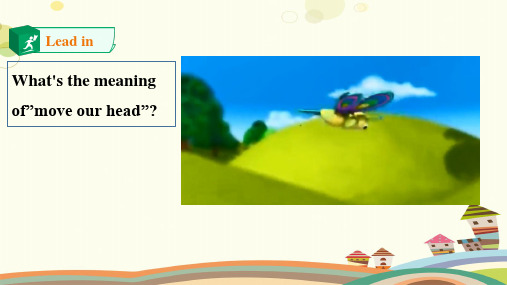
Presentation
1.housework[ˈhaʊswɜːk] n.家务劳动;家务事 不可数名词 do the housework做家务 I like doing the housework.我喜欢做家务。 改错:The houseworks make me tired. houseworks改为housework
Reading
1b Listen and write the activities next to the correct frequency
waolrwdas.ys (100%)
exercise read
usually
watch TV
often
help with homework
sometimes
Presentation
I could______control my feelings at the moment.The movie reminds me of my childhood. A.really B.nearly C.slowly D.hardly
Presentation
3.ever adv.在任何时候;曾经;从来 Have you ever been here? 你曾经来过这里吗? You can come here ever. 你随时可以来。
Presentation
Mary hardly knows about you,does she? 玛丽几乎不了解你,是吗? 辨析:hard与hardly hard,努力的,硬的,可做形容词或副词 hardly,副词,几乎不 He studies hard.他学习努力。 He studies hardly.他几乎不学习。
Lead in
人教版八年级英语上册U2PPT课件
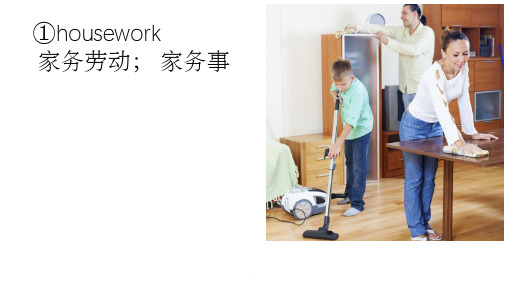
•TV program 电视节目 •A: How often do you watch TV? •B: I watch TV every day. •A: What’s your favorite program? •B: Animal World. •A: How often do you watch/see the program? •B: Twice a week. .
.
less adv. 较少; 较小 adj.& pron. 较少的; 更少的
用法1:little的比较级,表示更少 There are little milk in the cup There are less milk in the cup. Who drank it? 用法2:作为副词修饰形容词,表示更不怎么样 This bag is less expensive.这个包更便宜。 Jack is less happy.杰克更不高兴。 Jack is less happy than me.杰克比我更不高兴
-How often do you use the Internet?
-Everyday.
-Once a week.
-Twice a week.
-Three times a week.
I once went to Shanghai.
I went to Shanghai twice.
.
⑧program n. (= programme) 节目
①housework 家务劳动; 家务事
.
②hardly adv. 几乎不 •It is so dark in the room that I can hardly see anything.(hardly表示否定意义) =I can not see anything=I can see nothing •There is hardly any milk in the cup.
.
less adv. 较少; 较小 adj.& pron. 较少的; 更少的
用法1:little的比较级,表示更少 There are little milk in the cup There are less milk in the cup. Who drank it? 用法2:作为副词修饰形容词,表示更不怎么样 This bag is less expensive.这个包更便宜。 Jack is less happy.杰克更不高兴。 Jack is less happy than me.杰克比我更不高兴
-How often do you use the Internet?
-Everyday.
-Once a week.
-Twice a week.
-Three times a week.
I once went to Shanghai.
I went to Shanghai twice.
.
⑧program n. (= programme) 节目
①housework 家务劳动; 家务事
.
②hardly adv. 几乎不 •It is so dark in the room that I can hardly see anything.(hardly表示否定意义) =I can not see anything=I can see nothing •There is hardly any milk in the cup.
人教八年级上Unit2What'sthematter2课件
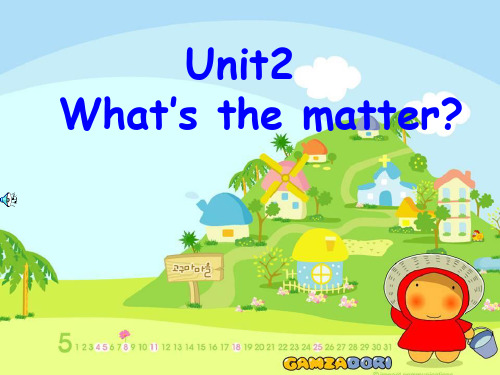
lots of water
Pairwork: A: I have a sore throat.
B: You should drink some hot tea with honey.
Listening practice
2a 1.Toothache 2.sore throat 3.Stomachache
A: What’s the matter?
B:I’m not feeling well. I have a ____.
A: When did it start?
B: About _____ ago.
A: Oh, that’s too bad. You should _____.
B: Yes, I think so.
What’s the matter? She has a sore throat.
What’s the matter?
He has a stomachache.
What’s the matter? He has a sore back.
Pairwork:
A What’s the matter? B I have a sore throat.
I. Lead in
Free talk.
*What food do you like to eat? *What is the healthy food? *What food is good for you?
II. Read and answer:
1.What do traditional Chinese doctors believe?
drink lots of water
Pairwork:
A: What’s the matter? B: I have a …
Pairwork: A: I have a sore throat.
B: You should drink some hot tea with honey.
Listening practice
2a 1.Toothache 2.sore throat 3.Stomachache
A: What’s the matter?
B:I’m not feeling well. I have a ____.
A: When did it start?
B: About _____ ago.
A: Oh, that’s too bad. You should _____.
B: Yes, I think so.
What’s the matter? She has a sore throat.
What’s the matter?
He has a stomachache.
What’s the matter? He has a sore back.
Pairwork:
A What’s the matter? B I have a sore throat.
I. Lead in
Free talk.
*What food do you like to eat? *What is the healthy food? *What food is good for you?
II. Read and answer:
1.What do traditional Chinese doctors believe?
drink lots of water
Pairwork:
A: What’s the matter? B: I have a …
八年级英语上册第二单元课件
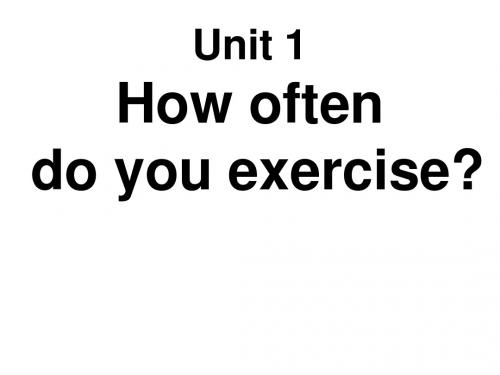
Discussion
Discuss with your partners your daily activities. How often do you do them? Why do you like them? Or why not? eg.A: What do you usually do on weekends? B: I like going shopping. A: How often do you go shopping? B: Twice a month. A: Why do you like it? B: It’s exciting.
2a 2b Number the activities first ,then
match the activities of Cheng
Activities How often every day
3 go to the movies 1 watch TV 5
shop
once a week
twice a week
Unit 1
How often do you exercise?
exercise
surf the Internet
have pizza
do chores
skateboarding
1.Go skateboarding 2.watch TV 3.Go Shopping 4.Reading 5.exercising
15% 95% 85%
once or twice a week 10% 0% 2%
three or four times a week 75% 5% 13%
Vocabulary Key
All students= 100% Most students= 51%-99% Some students=1%-50% No students=0%
人教版八年级英语上册课件:Unit 2(共29张PPT)

要点梳理
【举例】I have to attend an important meeting this afternoon. 今天下午我不得不参加一个重要的会议。
You must hand in your homework tomorrow morning. 明天早上你必须上交你的家庭作业。 【应用】用have to和must填空 1. If you want to pass the English exam, you _m__u_s_t_ study hard. 2. The bus didn’t arrive, so we __h_a_d__to__ wait.
课前导学
单元语法 频率副词的使用以及what与how often 句型的提
问、回答;一般现在时态的用法 语言目标
学会如何结合频度副词谈论事情发生的频率
要点梳理
重点词汇精析 1 exercise的用法 【教材例句】How often do you exercise? 你多久做 一次运动?(教材第9页) 【要点思维导图】
Unit 2 How often do you exercise?
Section A (1a~2d)
课前导学
核心单词 1. _h_o_u_s_e_w__o_r_k__ n. 家务劳动;家务事 2. __h_a_rd_l_y____ adv. 几乎不; 几乎没有 3. ___o_n_c_e____ adv. 一次;曾经 4. ____tw__ic_e____ adv. 两次;两倍 5. ___In_t_e_rn__e_t _ n. (国际)互联网;因特网 6. __p_r_o_g_r_a_m__ n. 节目 7. _____f_u_ll____ adj. 忙的;满的;充满的
- 1、下载文档前请自行甄别文档内容的完整性,平台不提供额外的编辑、内容补充、找答案等附加服务。
- 2、"仅部分预览"的文档,不可在线预览部分如存在完整性等问题,可反馈申请退款(可完整预览的文档不适用该条件!)。
- 3、如文档侵犯您的权益,请联系客服反馈,我们会尽快为您处理(人工客服工作时间:9:00-18:30)。
plays football They always ________ _________ (踢足球).
4. What does your mother do on Sunday? goes She usually ______ shopping (去购物). _______
1b
do some exercise watch TV
Translate and write them down.
1.周末你通常做什么? What do you usually do on weekends ? 2.他经常看电视。 He often watches TV. 3. 他几乎不逛商店。 He hardly ever goes shopping. 4. 他总是玩电脑游戏. He always plays computer games. 5. 她经常9点钟上床睡觉。 She often goes to bed at 9 o’clock.
1. help sb with sth
help sb (to) do sth help with sth
帮助某人 做某事
帮助做某事
2. housework 不可数名词
What do you do on weekends?
usually always often I hardly ever play football on weekends. sometimes never
1c
Pairwork
Make your conversations about what you do on weekends
-- What do you do on weekends? --I usually watch TV. --Do you go shopping? -- No, I never go shopping. / Yes, sometimes.
试一试
never 1. Tom ________ (从不) play sports.
on 2. What do you do ______ (在) weekends?
I usually ______ housework (做家务). _______ do 3. _____ ______ do you watch TV? How often Three times week _____ _______ a _____. (一周三次) 4. She _______ _______ (几乎从不) cooks hardly ever dinner.
does sports 4. John never _______ _______ (做运动).
5. 他经常去踢足球在星期天。 plays He often _____ football on Sunday ______.
6. Tom 从来不帮忙做家务。 never helps Tom _____ ______ with housework. 7.我的奶奶很少外出。 hardly ever My grandma _______ _______ goes out.
help with housework
Make sentences with these words:
On weekends always(100%)________________________ I always use the Internet. I usually watch TV. _________________________ 频 usually I often sleep late(睡懒觉). _________________________ 度 often
100% 80% 频 度 30-50% 副 20% 词 5% 0%
always 总是,始终 usually 通常,平常 often 经常,常常 sometimes 有时候 hardly ever 很少
never 从不
1. sometimes: 有时(频度副词)一般现在时;常用语
于句首,句中或句末。 sometime : 某个时候 (副词)常用于过去时或将来时。 some times : 几次,几倍 其中time是可数名词,对他提 问用How many times.
Weekend activities
usually
sometimes
What do you do on weekends?
go swimming I usually _______ ________ ,sometimes watch I ______ _______. TV
always
usually
-What does she/he do on weekends?
always does sports/exercises usually - She/He ___________ plays his homework. _________________.
sometimes -What does she/he do on weekends?
1. Are you free next week? 你下周有空吗? be free 有空,闲着 I am free.
eg:我有空。
2. Next week is quite full for me,Jack.
下周对我来说很忙,杰克。
full 忙的,满的,饱的 for 对…
eg: 我不能吃了,我相当饱了。
e
go shopping
help with housework
a c b read go shopping always(100%)____ exercise sometimes_________ d d watch TV usually__________ hardly ever ________ watch TV e a help with housework never(0%)_________ often___________ go shopping
Homework
1. Copy the new words,6 times.
2. Ask and answer, complete the chart.(P16 ,Part 1) 3. To read and remember the new words.
Unit 2
Section A 2d~3c
watch TV
play sports=exercise read books do my homework help with housework go to the movies play computer games
go shopping
根据汉语提示完成句子。 1. What do you do in the evening?
Talk about your weekends.
always
总是
use the Internet
usually
通常
watch TV
often
常常
sleep late
sometimes
有时
listen to music
hardly ever
几乎不
play computer games
never
从不
go shopping I often ______ ___________(去购物).
2. What _______ Amy do on weekends? does
watches TV She always ________ ________(看电视)。
helps with 3.Zhang Peng usually ________ _________ housework __________(帮忙做家务).
凡是用频度副词:always, usually, often, sometimes, hardly, never等回答句子或划线的问句,都用How often这个 句型。
1.What do you do in the morning?
watch TV I often ________ __________ (看电视).
Unit 2
Section A 1a~1c
动词第三人称单数形式变化规则 1.多数在动词后加s. 2.以s,x,sh,ch,o结尾的动词加 es . 3.以辅音字母加y结尾,把y改i再加es.
写出下列动词的第三人称单数。
watchwatches _______
do does _______ reads read ______ cooks cook _____
goes go _______ plays play ______
helps help ______
tries try ______
study ______ studies
1a. Look at the picture. Make a list of the weekend activities. 1.help with housework 2. go shopping 3. read books = do some reading 4. play sports = exercise 5. watch TV
I can’t eat,I am quite full.
3. How come?
怎么回事?(相当于why)
表示某件事情很奇怪,有点想不通。 但how much 开头的特殊凝问句使用的仍是 陈述句。 eg: 你怎么不早点告诉我这件事? Why didn’t you tell me about it?
2. What does he do after class? does homework He usually ______ ________ (做作业), cooks dinner sometimes he ______ ________ (做晚餐). 3. What do they do after school?
